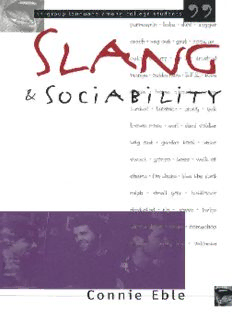
Slang and Sociability: In-Group Language Among College Students PDF
Preview Slang and Sociability: In-Group Language Among College Students
stang & sociatitlity Slang & sociatility In-Group Language among College Stud3ents C O N N I E E B L E The University of North Carolina Press Chapet Hill and London ©1996 The University of North Carolina Press All rights reserved Manufactured in the United States of America The paper in this book meets the guidelines for permanence and durability of the Committee on Production Guidelines for Book Longevity of the Council on Library Resources. Library of Congress Cataloging-in-Publication Data Eble, Connie C. Slang and sociability: in-group language among college students / Connie Eble. p. cm. Includes bibliographical references (p. ) and index. ISBN 0-8078-2279-5 (cloth: alk. paper).— ISBN 0-8078-4584-1 (pbk.: alk. paper) 1. College students —United States — Language (New words, slang, etc.) 2. College students —United States- Social life and customs. 3. English language —United States — Slang. 4. Group identity—United States. 5. Americanisms. I. Title. FE3727.s8E255 1996 427'.973-dc2o 95-47512 CIP 07 06 05 04 03 6 5 4 32 THIS BOOK WAS DIGITALLY PRINTED. In memory of my mother, Florence Brann Eble, and my godmother, Adele Eble Schwegmann Ledet This page intentionally left blank CONTENTS Acknowledgments, ix Introduction, i 1 Definition, 11 2 Form, 25 3 Meaning, 49 4 Borrowing and Allusion, 74 5 Use, 98 6 Effects, 116 7 Culture, 130 Appendix i. The Top Forty in Slang, 145 Appendix 2. Slang Items with at Least One Synonym, 147 Appendix 3. Some American College Slang circa 1900,150 Select Glossary of Student Slang, 155 Notes, 187 Works Cited, 193 General Index, 203 Index of Words, Expressions, and Affixes, 208 This page intentionally left blank ACKNOWLEDGMENTS A project that has been in the works and on the mind for fifteen years becomes hard to extricate from daily life. I can no longer sort out in my memory all of the people who encouraged me as this book gradually took shape from hundreds and soon thousands of three-by-five cards. I am grateful for all of the responses to con- ference papers and community lectures, interviews with journal- ists, and conversations with students, colleagues, and friends that both helped me organize and interpret the data and confirmed the human interest in the topic of slang. My first particular thanks go to my students at the University of North Carolina at Chapel Hill, those "Tar Heel voices" to whom my book College Slang 101 is dedicated. Several of them are ac- knowledged in the text or in the notes when I refer to their work. Elisa Fiorenza and Kenny Levine hold a special place in my af- fection, for they chose during the hectic second semester of their senior year to do independent studies with me on slang. My inter- actions with each of them as they worked diligently and cheerfully on their projects taught me as much as I taught them. The first linguist to encourage me to publish on slang was Charles Ruhl, who helped me impose order on the mounting piles of index cards when there were no models for studying slang. Charlie read and critiqued all of my early work on slang, and it clearly shows the influence of his monosemic view of the lexicon. My first conference paper on slang was presented at the an- nual forum of the Linguistic Association of Canada and the United States in 1979. The response was so supportive that I presented a paper on slang almost every summer after that, all of which are published in the appropriate volumes of The LACUS Forum and listed at the end of this book. I am grateful to LACUS for granting me permission to include portions of some of those papers here. But I am even more appreciative of the collegial spirit of LACUS over the years and the personal and professional friendship I have found there. My special thanks to LACUS colleagues Victor Yngve, James Copeland, and Marcel Danesi for reading everything I have written on slang. Richard Bernstein of the New York Times brought my work on slang to a general readership, and James Skardon of Spectacle
Description: